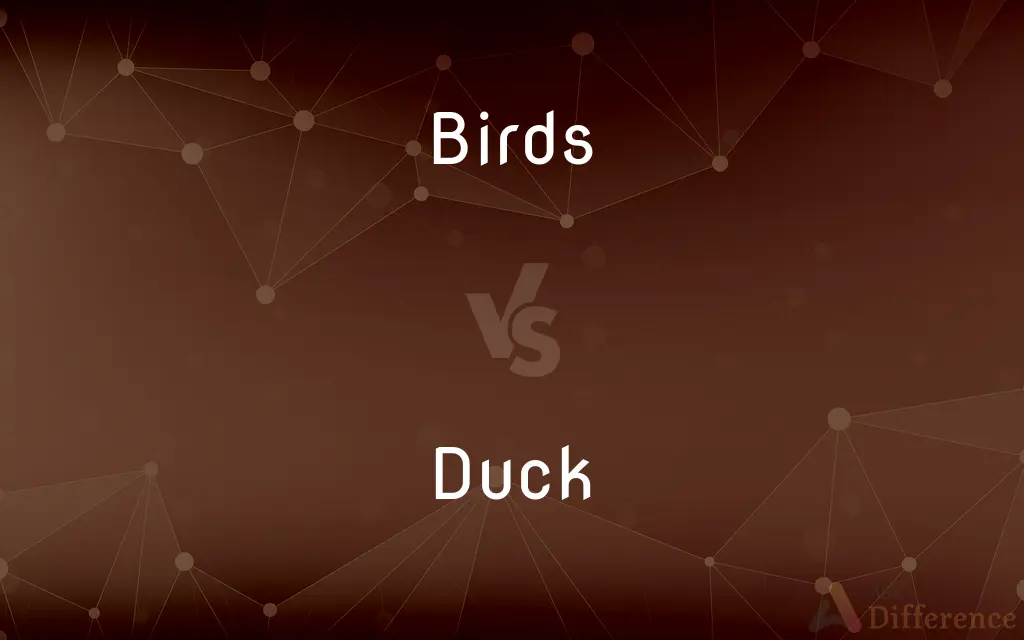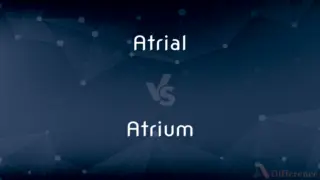Birds vs. Duck — What's the Difference?
By Tayyaba Rehman — Updated on October 30, 2023
Birds are a diverse group of warm-blooded, feathered creatures, while a duck is a specific waterfowl species within this group, known for its webbed feet and quacking sound.

Difference Between Birds and Duck
Table of Contents
ADVERTISEMENT
Key Differences
Birds are a broad class of feathered, egg-laying vertebrates. Ducks are a specific type of bird, belonging to the family Anatidae.
Birds inhabit diverse environments, from forests to deserts. Ducks are generally found in aquatic environments like lakes and rivers.
Birds display varied sizes and colors. Ducks are characterized by their broad bills, webbed feet, and often a waddling gait.
Birds exhibit a wide range of behaviors. Ducks are known for their swimming ability and distinctive quacking.
The bird kingdom encompasses thousands of species. The term duck refers specifically to numerous species within a narrower group.
ADVERTISEMENT
Comparison Chart
Classification
Broad class of vertebrates
Specific type within birds
Habitat
Diverse environments
Mainly aquatic environments
Physical Characteristics
Varied sizes and colors
Broad bills, webbed feet
Behavioral Traits
Wide range
Swimming, quacking
Diversity
Thousands of species
Narrower group of species
Compare with Definitions
Birds
Many birds have the ability to fly.
The birds soared across the sky.
Duck
A duck is a type of waterfowl.
We saw a duck swimming in the pond.
Birds
Birds encompass diverse species.
The park is home to many birds.
Duck
Ducks have webbed feet.
The duck waddled with its webbed feet.
Birds
Any of various warm-blooded egg-laying feathered vertebrates of the class Aves, having forelimbs modified to form wings.
Duck
Ducks are known for their quacking.
The ducks were quacking loudly.
Birds
Such an animal hunted as game.
Duck
Duck is the common name for numerous species of waterfowl in the family Anatidae. Ducks are generally smaller and shorter-necked than swans and geese, which are also members of the same family.
Birds
Such an animal, especially a chicken or turkey, used as food
Put the bird in the oven.
Duck
A waterbird with a broad blunt bill, short legs, webbed feet, and a waddling gait.
Birds
See clay pigeon.
Duck
A pure white thin-shelled bivalve mollusc found off the Atlantic coasts of America.
Birds
(Sports) See shuttlecock.
Duck
An amphibious transport vehicle
Visitors can board an amphibious duck to explore the city
Birds
(Slang) A rocket, guided missile, satellite, or airplane.
Duck
A quick lowering of the head.
Birds
(Slang) A person, especially one who is odd or remarkable
A sly old bird.
Duck
Dear; darling (used as an informal or affectionate form of address, especially among cockneys)
Where've yer been, ducks!
It's time you changed, my duck
Birds
Chiefly British Slang A young woman.
Duck
A strong linen or cotton fabric, used chiefly for work clothes and sails
Cotton duck
Birds
A loud sound expressing disapproval; a raspberry.
Duck
A batsman's score of nought
He was out for a duck
Birds
Discharge from employment
Lost a big sale and nearly got the bird.
Duck
Lower the head or the body quickly to avoid a blow or missile or so as not to be seen
Spectators ducked for cover
He ducked his head and entered
Birds
An obscene gesture of anger, defiance, or derision made by pointing or jabbing the middle finger upward.
Duck
Push or plunge (someone) under water, either playfully or as a punishment
Rufus grabbed him from behind to duck him under the surface
Birds
To observe and identify birds in their natural surroundings.
Duck
Refrain from playing a winning card on a particular trick for tactical reasons
Declarer ducked the opening spade lead
Birds
To trap, shoot, or catch birds.
Duck
Any of various wild or domesticated waterbirds of the family Anatidae, characteristically having a broad flat bill, short legs, and webbed feet.
Birds
Plural of bird
Duck
A female duck.
Birds
Birds are warm-blooded, feathered vertebrates.
Birds were chirping in the trees.
Duck
The flesh of a duck used as food.
Birds
Birds are known for laying eggs.
We found a bird's nest with eggs.
Duck
(Slang) A person, especially one thought of as peculiar.
Birds
Birds are noted for their distinctive calls.
The morning was filled with bird calls.
Duck
Often ducks (used with a sing. verb) Chiefly British A dear.
Duck
A quick lowering of the head or body.
Duck
A plunge under water.
Duck
A durable, closely woven heavy cotton or linen fabric.
Duck
Ducks Clothing made of duck, especially white pants.
Duck
An amphibious military truck used during World War II.
Duck
A similar vehicle used for civilian purposes, as to evacuate flood victims or for sightseeing tours. In both senses also called DUKW.
Duck
To lower quickly, especially so as to avoid something
Ducked his head as the ball came toward him.
Duck
To evade; dodge
Duck responsibility.
Ducked the reporter's question.
Duck
To push (a person, for example) suddenly under water.
Duck
In bridge, to deliberately play a card that is lower than (an opponent's card).
Duck
To lower the head or body.
Duck
To move swiftly, especially so as to escape being seen
Ducked behind a bush.
Duck
To submerge the head or body briefly in water.
Duck
To evade a responsibility or obligation. Often used with out
Duck out on one's family.
Duck
In bridge, to lose a trick by deliberately playing lower than one's opponent.
Duck
(intransitive) To quickly lower the head or body, often in order to prevent it from being struck by something.
Duck! There's a branch falling off the tree!
Duck
(transitive) To quickly lower (the head or body), often in order to prevent it from being struck by something.
Duck
(transitive) To lower (something) into water; to thrust or plunge under liquid and suddenly withdraw.
Duck
(intransitive) To go under the surface of water and immediately reappear; to plunge one's head into water or other liquid.
Duck
(intransitive) To bow.
Duck
(transitive) To evade doing something.
Duck
(transitive) To lower the volume of (a sound) so that other sounds in the mix can be heard more clearly.
Duck
(intransitive) To enter a place for a short moment.
I'm just going to duck into the loo for a minute, can you hold my bag?
Duck
(caving) A cave passage containing water with low, or no, airspace.
Duck
An aquatic bird of the family Anatidae, having a flat bill and webbed feet.
Duck
Specifically, an adult female duck; contrasted with drake and with duckling.
Duck
(uncountable) The flesh of a duck used as food.
Duck
(cricket) A batsman's score of zero after getting out. (short for duck's egg, since the digit "0" is round like an egg.)
Duck
(slang) A playing card with the rank of two.
Duck
A building intentionally constructed in the shape of an everyday object to which it is related.
A luncheonette in the shape of a coffee cup is particularly conspicuous, as is intended of an architectural duck or folly.
Duck
A marble to be shot at with another marble (the shooter) in children's games.
Duck
(US) A cairn used to mark a trail.
Duck
One of the weights used to hold a spline in place for the purpose of drawing a curve.
Duck
Synonym of lame duck
Duck
(medicine) A long-necked medical urinal for men.
Duck
A faggot; a meatball made from offal.
Duck
A tightly-woven cotton fabric used as sailcloth.
Duck
(in plural) Trousers made of such material.
Duck
A term of endearment; pet; darling.
Duck
(Midlands) Dear, mate (informal way of addressing a friend or stranger).
Ay up duck, ow'a'tha?
Duck
A pet; a darling.
Duck
A linen (or sometimes cotton) fabric, finer and lighter than canvas, - used for the lighter sails of vessels, the sacking of beds, and sometimes for men's clothing.
Duck
The light clothes worn by sailors in hot climates.
Duck
Any bird of the subfamily Anatinæ, family Anatidæ.
Duck
A sudden inclination of the bead or dropping of the person, resembling the motion of a duck in water.
Here be, without duck or nod,Other trippings to be trod.
Duck
To thrust or plunge under water or other liquid and suddenly withdraw.
Adams, after ducking the squire twice or thrice, leaped out of the tub.
Duck
To plunge the head of under water, immediately withdrawing it; as, duck the boy.
Duck
To bow; to bob down; to move quickly with a downward motion.
Duck
To go under the surface of water and immediately reappear; to dive; to plunge the head in water or other liquid; to dip.
In Tiber ducking thrice by break of day.
Duck
To drop the head or person suddenly; to bow.
The learned pateDucks to the golden fool.
Duck
Small wild or domesticated web-footed broad-billed swimming bird usually having a depressed body and short legs
Duck
(cricket) a score of nothing by a batsman
Duck
Flesh of a duck (domestic or wild)
Duck
A heavy cotton fabric of plain weave; used for clothing and tents
Duck
To move (the head or body) quickly downwards or away;
Before he could duck, another stone struck him
Duck
Submerge or plunge suddenly
Duck
Dip into a liquid;
He dipped into the pool
Duck
Avoid or try to avoid fulfilling, answering, or performing (duties, questions, or issues);
He dodged the issue
She skirted the problem
They tend to evade their responsibilities
He evaded the questions skillfully
Duck
Ducks have a broad bill.
The duck used its broad bill to forage.
Duck
Ducks typically inhabit aquatic environments.
The ducks were at home in the water.
Common Curiosities
Are all birds capable of flying?
No, some birds, like ostriches, are flightless.
Do ducks migrate?
Many duck species migrate seasonally.
Do all birds lay eggs?
Yes, all bird species lay eggs.
Are birds warm-blooded?
Yes, all birds are warm-blooded.
Do birds have feathers?
Yes, all birds have feathers.
Can birds live in aquatic environments?
Yes, some birds, like ducks, thrive in aquatic habitats.
What do ducks eat?
Ducks eat aquatic plants, insects, and small fish.
How do birds communicate?
Birds communicate through calls, songs, and body language.
Do ducks have predators?
Yes, ducks have predators like foxes and large birds.
Are ducks social animals?
Many duck species are social and form groups.
Are ducks good swimmers?
Yes, ducks are excellent swimmers due to their webbed feet.
Can ducks fly?
Yes, most ducks are capable of flying.
Do birds have a sense of smell?
Some birds have a well-developed sense of smell, but it varies by species.
Are all ducks the same size?
No, duck species vary in size.
Can birds see in color?
Yes, most birds have good color vision.
Share Your Discovery

Previous Comparison
Conscious vs. Mindful
Next Comparison
Atrial vs. AtriumAuthor Spotlight
Written by
Tayyaba RehmanTayyaba Rehman is a distinguished writer, currently serving as a primary contributor to askdifference.com. As a researcher in semantics and etymology, Tayyaba's passion for the complexity of languages and their distinctions has found a perfect home on the platform. Tayyaba delves into the intricacies of language, distinguishing between commonly confused words and phrases, thereby providing clarity for readers worldwide.














































